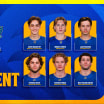Even having scored two goals, they could have had more. One of their best shifts came late in the first period, just before the Oilers got on the board. The line of Ryan O'Reilly, Sam Reinhart and Kyle Okposo had carried the puck into the zone with 3:54 remaining in the period and, thanks to the forecheck work of Larsson and Foligno behind the net, the puck stayed there until Gionta had a put-back chance 40 seconds later.
For the Sabres, the best defense is a good offense. They're game plan entering the game was to make McDavid and Co. defend, and it worked.
"I think that was one of our key points," Bylsma said. "Yeah, we want to make it hard on McDavid and we want to take away his space and speed, but we want to make them defend and, as a checking line, that's something they do extremely well."
Gionta said after the game that the pressure of playing against top lines also forces he and his linemates to simplify their own game to avoid making costly mistakes as they carry the puck through the neutral zone.
"Definitely," Foligno said. "You're not trying to do too many risky plays and I think that will frustrate them. I think it did last game. We really just kept it simple, we tried to beat them with our strength and speed and we didn't really cough up much. They thrive on turnovers and we really didn't give them anything."
The home team gets last line change in the NHL, so the fact that Bylsma uses the Larsson line to begin road games as he did Sunday is a testament to his faith in their shutdown abilities. The challenge is no different on Tuesday in Calgary. The Flames have a roster full of young gunners, starting at the top with Johnny Gaudreau and Sean Monahan.
"We're really looking at a Calgary team that is a lot like the Edmonton team with the skill and the way they play up front," Bylsma said. "That's something we're going to have to be really aware of."




















